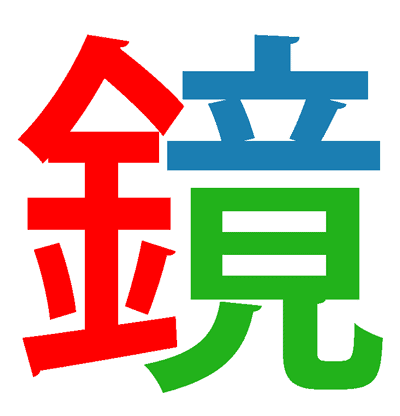鏡 – Words using 鏡
In today’s lesson, we will look at five words using the kanji for mirror: 鏡 kagami

You may remember this kanji by looking at its three parts:
金 (gold)
立 (stand)
見 (to see)
You stand to see yourself as gold.
Kagami by itself means “mirror” and is thought to have come from shadow (影) and to look (見). Shadow, 影 kage, also can have the meaning of reflection or image. So kagami may have come from kagemi–looking at one’s image.
Anyway, kagami means “mirror” today and is the basis for our words in this lesson.
私が鏡を見ると、鏡が割れます。
watashi ga kagami wo miruto, kagami ga waremasu.
When I look at a mirror, the mirror breaks.
Another reading for kagami is kyou and when stuck at the end, it acts kind of like the English suffix “-scope”
Here are the three main words:
- 望遠鏡 bouenkyou telescope
- 双眼鏡 sougankyou binoculars
- 顕微鏡 kenbikyou microscope
望遠鏡 bouenkyou telescope
You’ll recognize the 鏡 as kyou. The first two characters 望遠 bouen mean “to see at a distance.” So, 望遠 bouen plus kyou means telescope.
双眼鏡 sougankyou binoculars
双眼 sougan means both eyes and when kyou is added, it becomes binoculars.
顕微鏡 kenbikyou microscope
The first kanji 顕 means “exposed,” “unconcealed”. The second is “something very small.” With kyou, you are exposing something very small.
Here are two bonus words that you may already know.
- 眼鏡 megane (eye) glasses
- 虫眼鏡 mushi megane magnifying glass






Hi! please can you help me with the pronunciation of the kanji for binoculars and glasses. Binoculars has one extra ‘kanji element’ at the beginning and the rest is the same, but the whole word is said differently. Sou-gan-kyou for binoculars.. but, me-gane for glasses. If I was to guess by myself, I might have thought sou-me-gane for binoculars, if I already knew ‘glasses’.
Thankyou for your help!